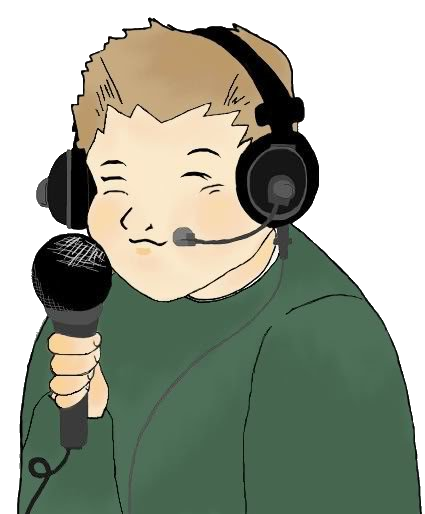 |
 |
 |
 |
 |
 |
Time Machine: The Second Format
Can a major format revamp make a terrible show
better?
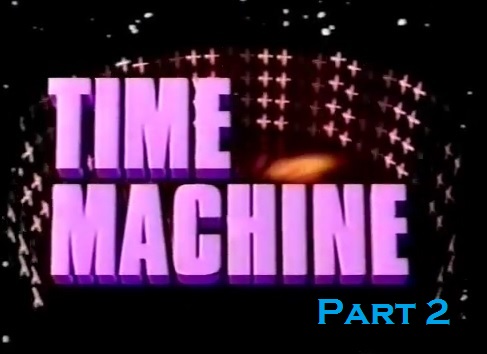
NBC (February - April 1985)
Last time here on Game Show Garbage we talked about the first five weeks of Time Machine and its format. Needless to say the world wasn't too accepting of Reg Grundy's answer to Price Is Right meets History Class with the Ken Doll game show host equivalent playing Bob Barker. Now, it's Mid-February and NBC is already seeing its much ballyhooed third Reg Grundy show failing to gain traction, so the decree was made to Reg to fix this so that they can keep this ship sailing. Reg Grundy decided he will, and thus saw one of the more jarring changes in format to something that looks completely different. While this is a jarring change, it pales in comparison to the format change Play The Percentages went through in March of 1980. (Rest In Peace, Geoff Edwards.)
So, let's take a look at Time Machine's second format and see if anything, if at all has improved.
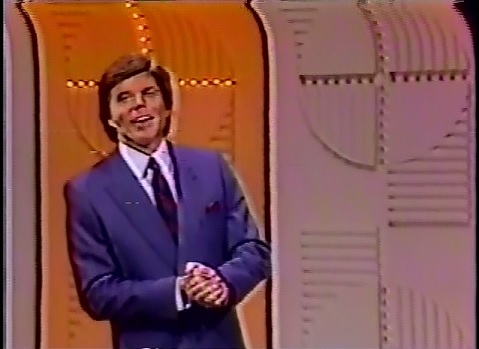
I would be remiss to talk about John Davidson's abilities after the new format took place. Looking back at the last 11 weeks, he started to find a groove, much like one of his records from back in the day. Sure he wasn't as terrible in the beginning when he told everyone on the premiere show, "If you're watching us for the first time, this is our very first show and we plan on being here for a long time." After that rocky week, he was more calm and better equipped to handle the format.
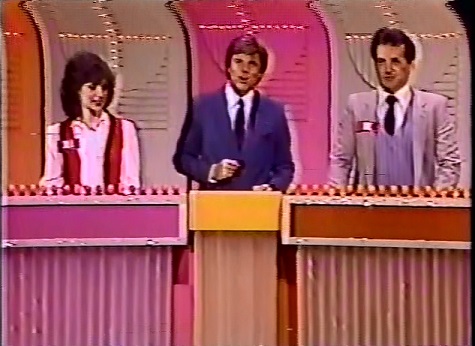
The overall format changed as well. Instead of a vapid Price Is Right clone, we get this. Two new contestants each day compete in three games and the winner of two games plays the champion in the challenge round for a new car. Instead of a prize jackpot, it's now just a car. Sounds ok, I can understand why the show cut out the prize jackpot because the show was tanking and needed to save budget and face. Now what will be terrible is that the game structure never changed. Once the first game was revealed, you knew what games 2 and 3 would be, and that's one thing I'll give the first format credit for in that there was variety.
Here were the first set of games
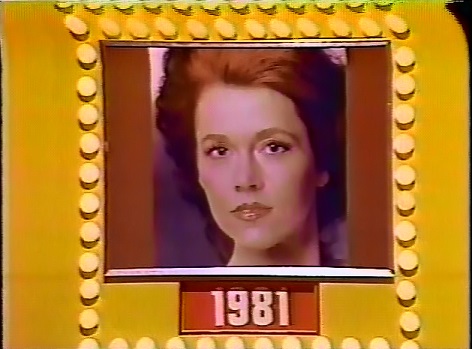
Set 1 Game 1 was As Time Goes By. Instead of being within 5 years of the celebrities picture, now one contestant gives a year for the picture, and the other contestant had to decide if the actual year was before or after the first contestant gave. So, it worked like Card Sharks, but with dates, or more specifically, the Educated Guess that would be implemented in October of 1986 when Card Sharks got revived.
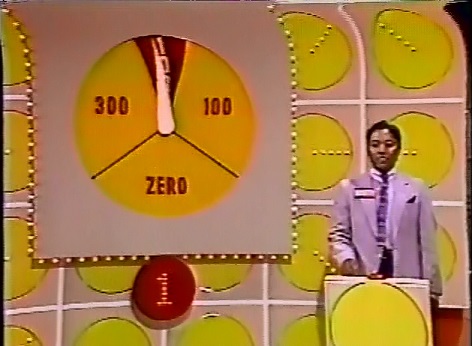
Then the contestant took their spins to the money clock, pending if they actually did have spins. The contestants could hit either $100, $0, $300 or $1,000. Same as before the contestants turned their back to the clock and whatever they hit, they kept. The contestant with the most money won. Now, I bring up one thing, the contestants kept the money, which is a vast improvement from having it put into a prize bank where it meant nothing unless you won the Time Capsule round. This is also a vast improvement over the original format of As Time Goes By.
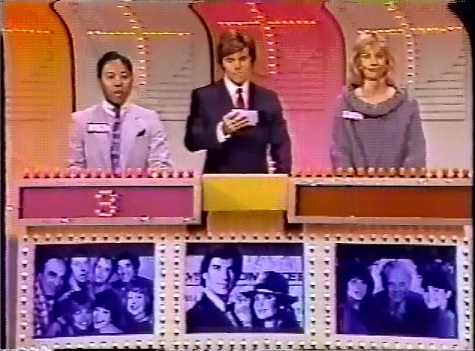
Set 1 Game 2 was the Tube Game. In another version of taking an ok game and improving it, the two contestants are given a network, a year, and John would start describing a TV show. The first contestant to buzz in correctly will get a point. After the same was done with NBC and CBS, John would fire off a volley of questions relating to the three shows until someone got 5 points and would win the game and a prize. I prefer this to the old version, mainly because it played better than a lamer version of Bonus Game. Not only that, it had some meat to its bones, with more emphasis on game rather than luck.
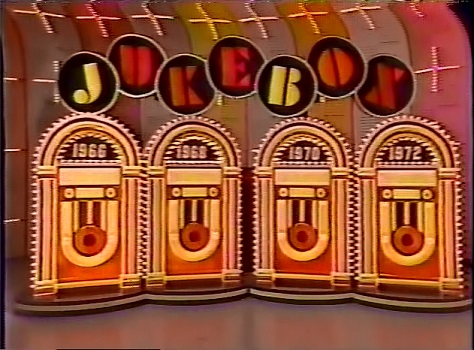
The final game of Set 1 is a brand new game in The Jukebox Game. In this game, four jukeboxes were rolled out with a year in each one. John would cue up a piece of music and give two artists, the contestant must match up the artist of the song and then match the year from the four jukeboxes. If the contestants do that, then they earn a point. After all four jukeboxes were exhausted, then all the contestant has to do is identify the artist to get the point. The first person to get 3 points wins a prize. It reminds me of the opening round of Face The Music, but more often than not, contestants would miss years more often than get them right, so The Jukebox Game tended to drag quite a bit.
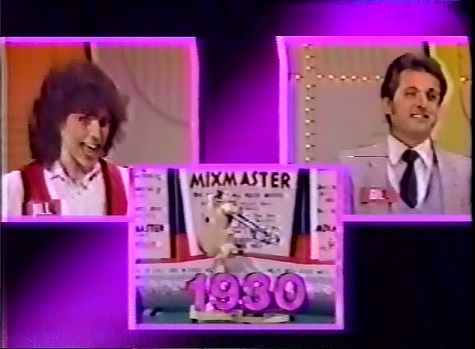
Set 2 started off with On The Button. Essentially, it's a revamped version of Sweet Sixteen. John would give a moment in history and the contestants would ping-pong back and forth years until one got it right and earned a point. First to three points would win a prize. This reminds me of the way Australian Price Is Right did their showcase and I like this game. Anything that made a lame Lucky 7 clone into something better is good in my book.
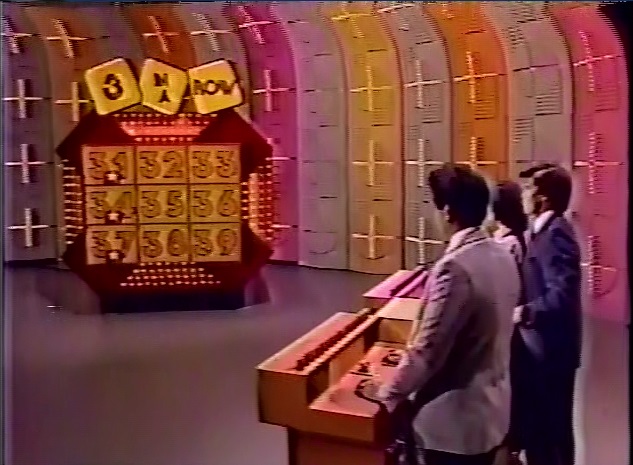
The next game in set 2 is Magical 3 In A Row. This game played like the original 3 In A Row, but with a little twist. One of the rows would be marked with stars and contestants would pick from one of two given moments in history.
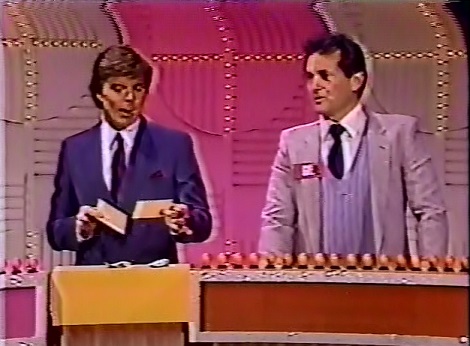
After picking a moment in history, a year would light up. If one of the years in the Magical Row lit up, they would get $100 to keep. They would go back and forth picking years until one lit up the third year that completely lit up the Magical Row in order to win the game and a prize. Out of all three formats of 3 In A Row, this would be the worst one. That isn't saying it is bad. I kind of prefer the second version of the game better, seeing how it had a clear format without adding any dumb gimmicks like the poison cards.
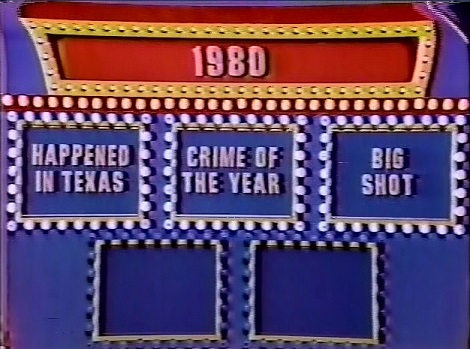
The final game is the Main Event. The game starts with $200 in the pot and each contestant picks a category and is asked a question with two possible answers. Each correct answer adds $200 to the pot, so a possible $1,200 is available. After all 5 questions are asked, the clues are revealed and the first contestant to buzz in with the right answer wins all the money in the pot. I've not been a fan of the Main Event game itself, but it's ok. That's really my opinion on this and it's ok.
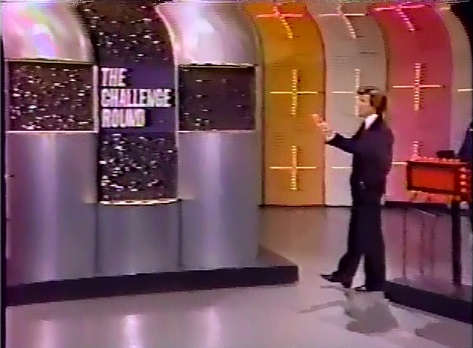
The contestant who won 2 out of 3 games played the champion in The Challenge Round, which is basically the same format as Time Capsule, but played with the winner of the first half of the show and the champion. John will list off four items from a year, along with a hit song from that year. The two contestants will guess what year it is ala Price Is Right. The person closest to the year wins the game and plays the bonus game.
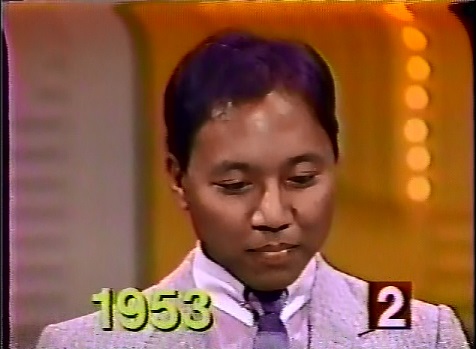
The end game is much like the 2nd bonus game from the first format. A contestant is given four headlines and has to guess if they were before or after the base year, which might help explain why Before Or After was retired. If a contestant got all four right, they would win a brand new car and was retired from playing anymore. If they missed one, the game was over. For each day a contestant returned, it meant one less headline they'd have to get right. So, by that logic, a 5 time champion automatically won the car.
Sadly, this format change, although for the much better, couldn't save Time Machine and was slated to be axed after 13 weeks. However, in a bit of luck for the show, the show that was supposed to replace Time Machine wasn't ready, so Time Machine got 3 more weeks on the air and was axed on April 26th. Don't cry for John Davidson though, since he'd find steady work in 1986 with Hollywood Squares, and the models would find their way onto other shows, such as Suzanna Williams, who would become one of the dealers on Card Sharks.
Now if you're wondering if this is an induction or not, well....it isn't. This format is good, but some of the games themselves had faults that needed to either be critiqued or needed to be shows that this format and idea could be executed well. Maybe it's a refreshing change for the site. Sometimes one gets tired of ragging on shows that he needed to put out a positive article for once.
Once again, it was too little, too late for Reg Grundy who racked up his first US failure. Sadly, he wouldn't have another big hit in the US as Bruce Forsyth's Hot Streak would be another 13 week wonder, Scattegories was an unmitigated disaster, the revival of Scrabble was a victim of said Scattegories disaster & Small Talk was interesting, but mired by one of the worst game show hosts in history in Wil Shriner.
Have any questions about the site? Submit them to us via our Facebook page, our Twitter, and through e-mail. We'll be sure to answer them to the very best of our ability.
(c) 2009-2017 - A CQS Production.
